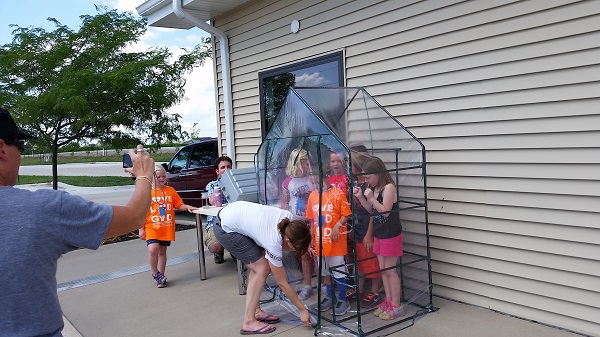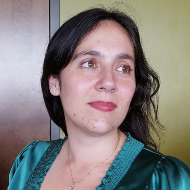I’ve been pretty busy out here in Iowa City, what with tracking down sweet, mysterious fossils and all. This is the place where we’re piloting one of our new initiatives, the Science Booster Club Project. I’ve been working to organize science-loving people in this community so that they can support local science teachers. It’s been three months now, we have over two hundred members, and we’re getting ready to host our first community science event. If we manage to raise as much money as I think we can, there are several important projects we could fund for local teachers. The community could give money to schools so that they could compost their food waste, teaching kids about sustainability every day as they nourish the school gardens that help feed them. Alternatively, several local teachers have asked if we can help pay for basic lab supplies, such as chemical-resistant tables and cabinets, that would allow them to safely teach entirely new lessons.
I think it’s amazing how much people around here want to support science in the local schools, and how clearly they say they want more access to science education for themselves and their children. And do you want to know the first community organization that reached out to us wanting more science? A church! We were asked to spend an afternoon teaching science at a Bible camp.
I am not sure that NCSE has ever partnered with a Bible camp before. I went into the whole thing a little nervous. Maybe a little concerned about controversy. But more to the point, I had never been to anything like a Bible camp before. What do they do? Would we speak the same language?
Despite these questions and concerns, things went very well. While the scene was chaotic, the outcome was quite simple. My awesome interns and I taught one hundred and twenty three kids about climate science for two hours, and everyone had a great time.
The kids learned about CO2 by dumping Pop Rocks in different kinds of soda and blowing up balloons with the resulting reaction. Then they learned about the greenhouse effect and how CO2 is involved. We set up a small greenhouse and had the kids go in and out to feel the difference. We showed them with gas-sensing probes that CO2 was in their breath, that CO2 levels change in closed environments, and how more and more CO2 accumulated the more kids we crammed in the greenhouse. After learning a little about human effects on systems, the kids learned about urban heat islands and their impacts on animals. They ran around outside like maniacs with a bunch of temperature guns, gathering data on the temperatures of different surfaces, filling out a map, and looking for trends in their data

Pretty good stuff, we thought. Science content in the context of authentic science practice, delivered as requested by a community, in a church. Climate science and climate change don’t have to be divisive topics. The conflict between science and religion that some people get all worked up about is just not present in most religious institutions.
Raising community support for science is the goal of the Science Booster Club Project. As we reach out to communities to help them organize their support of local teachers, we would be foolish not to partner with as many pro-science community organizations as possible. If you listen to too much of the same media or spend your life trapped in an internet bubble, you might not think local religious organizations would make good partners for an organization like ours. But they are. I know a lot of the people who read this blog see themselves as voices for science in their communities. It’s worth thinking about what friends we can make. There are a lot of people from all walks of life in our communities who care deeply about their children’s educations. When it comes to forging alliances, let’s not automatically rule anybody out.

